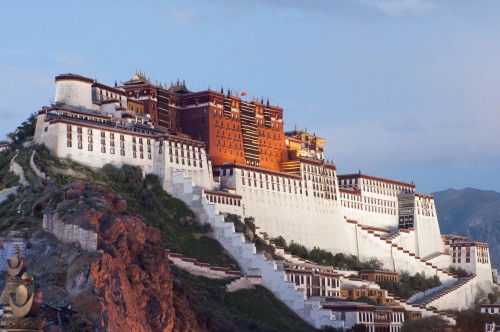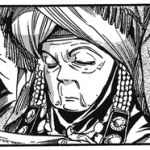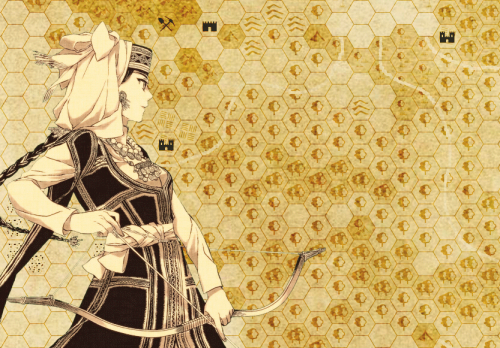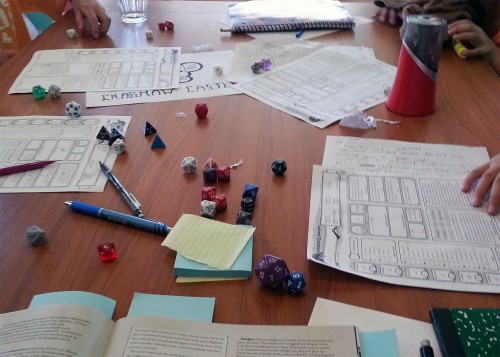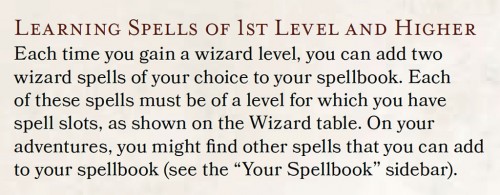Relating almost entirely to the situation and typical attitudes of the people of Cach and its satellite city-states.
The people of the city states think themselves civilized, the masters of their surroundings and bringers of order and prosperity to an unruly world. And with good reason. Their walls are tall and strong, their fields and fishing fleets are bountiful, their mines are rich and deep. The markets and caravans make all available in plenty to those with the means to buy. Meanwhile the barbarians nomads and hill-people scrabble by desperately in squalor and ignorance, binding themselves to fickle sprites and pixies and what-have-you. It is no wonder that they envy the comfort and wealth of the cities. That they have not abandoned their foolish, crass ways and accepted proper culture and laws is truly a tragedy.
Cachic society is diverse, with several distinct races living side by side under common principles of mutual tolerance and support. Healthy rivalries between craftsmen, families, mercenary companies, and cities result in a noisy but functional meritocracy of sorts. Social mobility between classes is somewhat rare due to the various native gifts of the laboring poor, the artisan, the lesser gentry and high nobles, but within these rough strata competition is nearly constant and excellence finds itself rewarded. The incompetent and unlucky must sometimes serve as motivational examples, ground up and spat out by the process as cautionary tales. In the past sixty years or so a shift towards the creations of guilds with legal monopolies over specific fields has taken root in Cach itself, providing some protection and structure not previously seen. This dismays some of the more conservative citizenry who prefer motivations of personal ambition, family, and state to remain dominant forces.
The exertion of military power is handled at three scales: the mercenary company, the house armsmen, and the state militia. Mercenary companies are entities created through legal contract, with charters filed in the public records of the city they operate out of. Individual soldiers, officers, and other agents enter into contracts with the company just as the company enters into contracts with patrons. Companies range in size from banner of less than ten to entire battalions of three hundred or more. A mercenary company will typically operate until the retirement or death of its captain, sometimes re-incorporating under new leadership under a new charter. House armsmen are gentry and nobles loyal to a particular noble house that can be called upon to fight for the interests of that house. Some will participate personally, some hire mercenaries to accompany them, and others send mercenaries in their stead. An ambitious gentleman will almost always personally serve in conflicts as a matter of reputation. The state militia is almost always a hodgepodge of house armsmen and a few mercenary companies under long-term garrison contracts. The cities of Cach, Hamza, and Sergeli maintain standing military fleets crewed by such mercenaries with local gentry serving as officers.
Dwarves – Few in number, the Dwarves are perhaps the most insular of the civilized folk. Over the generations they have gravitated toward each other, their nobles feuding almost exclusively with each other until only a single noble line, House Binici, remains. The common Dwarves tend to live and work in the same neighborhoods as each other, and primarily stick to the cities of Bektemir and Cach. Dwarves can be found elsewhere during their professional lives, but nearly all of them raise their children in the Dwarven enclaves. House Binici holds a disproportionate number of seats in the Cachic Council of Elders, in part due to simple Dwarven longevity and in part due to centuries of skillful political maneuvering and alliances that last entire generations for the shorter-lived people.
Halflings – The Cachic city-states are positively overrun with Halflings. They work the fields, staff the shops and bureaucracies, fill the slums, work the manufactories, and generally the salt of the earth citizenry that keep everything working. Halfling politicians have somewhat less influence than the sheer number of their people would suggest. This is largely due to an inclusive attitude among the Halflings regarding the other civilized races; they don’t much care if their leaders are from some other race. They have five major noble houses scattered across the civilized lands, with sixteen seats on the Cachic Council of Elders. They are not known to vote as a bloc.
Humans – Less numerous than the Halflings but nearly as ubiquitous, Humans play a similar role in Cachic society. Individual Humans are somewhat more likely to indulge in ambition and great endeavors than their smaller counterparts. They currently have seven major noble houses with a massive twenty-four seats on the Cachic Council of Elders. The interests of their houses are diverse and often in conflict internally and against each other. Even individual noble families, particularly Houses Yilmaz and Uzun, don’t vote as a bloc, with split votes being the norm. Perhaps for this very reason is is common to see a Human as Lord High Executioner; it is typically expected that a Human will put his ideals and personal interests before that of nepotism.
Tieflings – More numerous than the Dwarves, but only just, the Tieflings have a particular rapport with the infernal forces that make magic broadly available to the settled peoples. Tiefling children are raised with expectations of becoming merchants, cult functionaries, or politically active in some way. The great House Kasabian of Cach, with its nine seats in the Council of Elders, is a Tiefling family renowned for its cunning use of alliances and favors. Many prominent Warlocks and Paladins have been Tieflings, with several of today’s most influential and popular cults being run by both common-born and noble horned men and women.


